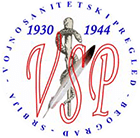Issue: Vojnosanit Pregl 2020; Vol.77 (No. 7)
O,O'-diethyl-(S,S)-ethylenediamine-N,N'-di-2-(3-cyclohexyl) propanoate dihydrochloride enhances influx of effective NK and NKT cells in murine breast cancer
Authors:
Milena Jurišević, Nikola Jagić, Nevena Gajović, Aleksandar Arsenijević, Milan Jovanović, Marija Milovanović, Jelena Pantić, Ivan Jovanović, Tibor Sabo, Gordana D. Radosavljević, Nebojša Arsenijević
Background/Aim. O,O'-diethyl-(S,S)-ethylenediamine-N,N'-di-2-(3-cyclohexyl)propanoate dihydrochloride (DE-EDCP) has been found to possess promising cytotoxic activity against various tumor cell lines. Also, DE-EDCP reduces tumor progression by several mechanisms such as triggering tumor cell death and inhibition of cell proliferation. The aim of present study was to further evaluate anti-tumor activity of DE-EDCP by investigating effects on migratory potential of tumor cells and anti-tumor immune response. Methods. Migratory potential of DE-EDCP was evaluated by scratch wound assay. Female BALB/c mice were inoculated with 4T1 breast cancer cells and treatment with DE-EDCP started five days following orthotopic tumor implantation. The frequency and phenotype of tumor-infiltrating natural killer (NK) and natural killer T (NKT) cells were analyzed by flow cytometry. Results. DE-EDCP inhibited migratory potential of highly metastatic 4T1 cells. DE-EDCP facilitated accumulation of CD3+CD49+ NKT cells and CD3-CD49+ NK cells in tumor microenvironment. DE-EDCP treatment led to significant decrement of tumor infiltrating anergic NKT cells expressing cytotoxic T-lymphocyte-associated protein 4 (CTLA-4), killer cell lectin like receptor G1 (KLRG-1) and programmed cell death protein-1 (PD-1). Mice given DE-EDCP had significantly increased percentages of tumoricidal fas ligand (FasL) positive NK cells. Conclusion. DE-EDCP inhibits murine breast cancer progression through direct effects on tumor cells and by facilitating anti-tumor immunity. DE-EDCP enhances accumulation, promotes tumoricidal phenotype and maintenances responsiveness of NK and NKT cells in 4T1 murine breast cancer.

